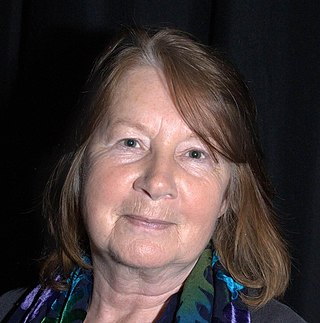
Paul Muldoon is an Irish poet.

Irish literature is literature written in the Irish, Latin, English and Scots languages on the island of Ireland. The earliest recorded Irish writing dates from back in the 7th century and was produced by monks writing in both Latin and Early Irish, including religious texts, poetry and mythological tales. There is a large surviving body of Irish mythological writing, including tales such as The Táin and Mad King Sweeny.
The 36th (Ulster) Division was an infantry division of the British Army, part of Lord Kitchener's New Army, formed in September 1914. Originally called the Ulster Division, it was made up of mainly members of the Ulster Volunteer Force, who formed thirteen additional battalions for three existing regiments: the Royal Irish Fusiliers, the Royal Irish Rifles and the Royal Inniskilling Fusiliers. The division served from October 1915 on Western Front as a formation of the British Army during the Great War.
Events in the year 1911 in Ireland.

William Forbes Marshall was an Irish poet and Presbyterian minister from Sixmilecross, County Tyrone, Ireland. He was the younger brother of the Rev. Robert Lyons Marshall, professor, poet and dialect writer.
Francis Arthur Ormsby is an author and poet from Northern Ireland.
Ciaran Gerard Carson was a Northern Ireland-born poet and novelist.
Gerald Dawe was an Irish poet, academic and literary critic.
James Stewart Alexander Simmons (1933–2001) was a poet, literary critic and songwriter from Derry, Northern Ireland.

Medbh McGuckian is a poet from Northern Ireland.
Murals in Northern Ireland have become symbols of Northern Ireland, depicting the region's past and present political and religious divisions.

John Harold Hewitt was perhaps the most significant Belfast poet to emerge before the 1960s generation of Northern Irish poets that included Seamus Heaney, Derek Mahon and Michael Longley. He was appointed the first writer-in-residence at Queen's University Belfast in 1976. His collections include The Day of the Corncrake (1969) and Out of My Time: Poems 1969 to 1974 (1974). He was also made a Freeman of the City of Belfast in 1983, and was awarded honorary doctorates by the University of Ulster and Queen's University Belfast.
Events during the year 1968 in Northern Ireland.

A Letter from Ulster is a 1942 documentary by Ulster-born movie director Brian Desmond Hurst who, along with his lifelong friend Terence Young (scriptwriter) and fellow Ulsterman and Assistant Director William (Bill) MacQuitty, created this film promoting a sense of community between the people of Northern Ireland and over one hundred thousand troops from the US based in Northern Ireland at the time. William Alwyn provided music.

That part of the United Kingdom called Northern Ireland was created in 1922, with the partition of the island of Ireland. The majority of the population of Northern Ireland wanted to remain within the United Kingdom. Most of these were the Protestant descendants of settlers from Great Britain.
Roy McFadden was a Northern Irish poet, editor, and lawyer.
James Trevor King, also known as "Kingso", was a British Ulster loyalist and a senior member of the Ulster Volunteer Force (UVF). He was commander of the UVF's "B" Company, 1st Belfast Battalion, holding the rank of lieutenant colonel. On 16 June 1994, he was one of three UVF men gunned down by the Irish National Liberation Army as he stood on the corner of Spier's Place and the Shankill Road in West Belfast, close to the UVF headquarters. His companion Colin Craig was killed on the spot, and David Hamilton, who was seriously wounded, died the next day in hospital. King was also badly injured; he lived for three weeks on a life-support machine before making the decision himself to turn it off.
Denis Liddell Ireland was an Irish essayist and political activist. A northern Protestant, after service in World War I he embraced the cause of Irish independence. He also advanced the social credit ideas of C. H. Douglas. In Belfast, his efforts to encourage Protestants in the exploration of Irish identity and interest were set back when in 1942 his Ulster Union Club was found to have been infiltrated by a successful recruiter for the Irish Republican Army. In Dublin, where he argued economic policy had failed to "see independence through," he entered Seanad Éireann, the Irish Senate, in 1948 for the republican and social-democratic Clann na Poblachta. He was the first member of the Oireachtas, the Irish Parliament, to be resident in Northern Ireland.
Ruth Carr, also known as Ruth Hooley, is a Northern Irish writer.
David Herbison was an Irish poet, known as "the Bard of Dunclug". Some of his poems are in the Ulster Scots dialect, and he was one of the group of poets known as the Rhyming Weavers.






